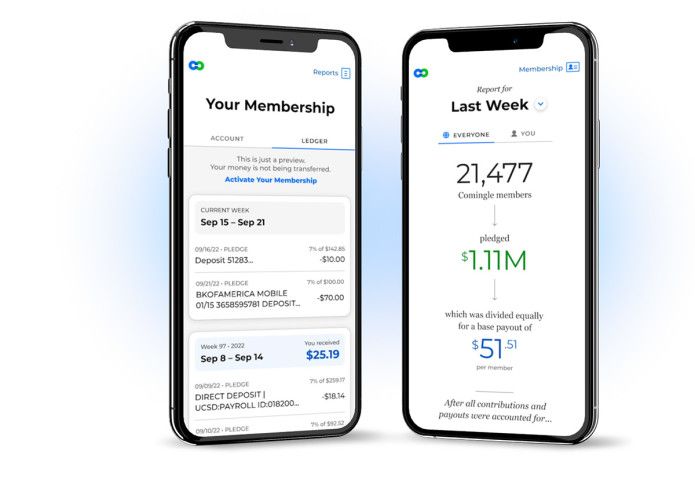Time To Crowdfund a UBI Platform

As some of you already know, I'm excited about the potential for Comingle. It's an app that once fully developed and launched will provide a small basic income of around $200 a month, paid weekly, to everyone who signs up for it, who commits 7 percent of their weekly income to join the community and make it possible.
Today, the future launch of Comingle is that much closer with the launch of a crowdfunding campaign for it on Indiegogo. Here's the co-founder of Comingle to tell you all about it.
So why am I personally so excited about Comingle and why do I think it's so important to get launched? I believe we're facing a kind of Catch-22 where the lack of UBI makes UBI more difficult to get legislated, and where if only we already had a UBI, it would be easier to win a national UBI. So I think we need to essentially bootstrap the process by going around government to get a small UBI going, to make a full poverty-eradicating UBI via government more possible.
There are a few key obstacles to a wide understanding and mass support for UBI that I think Comingle will help with. One of them is the lack of understanding that UBI is always paired with some amount of taxes. This lack of understanding is why so many people immediately think UBI will be inflationary, because they think everyone gets free money and thus the money supply must get expanded. But taxes are part of UBI which makes it possible for UBI to be deficit-neutral and thus non-expansionary. In the case of Comingle, the mechanism is essentially a flat 7% income tax. No new money is created in the case of Comingle, obviously, and instead money shifts from those above the average income to those below the average, in proportion to the distance below the average. That's how UBI works.
Understanding that also helps understand another obstacle to UBI, which is the concern that rich people get it too. Many of those outside the Comingle community will continue having that concern. No one inside the Comingle community should have that concern, because they will understand that if Bill Gates were to sign up for Comingle, 7% of his income is much greater than the small UBI he will receive. He would be a net payer to the community and would essentially be volunteering to increase his income taxes by 7% in order to help pay everyone in the community $50 a week, which to him is nothing and merely reduces his self-imposed new tax to 6.9999999% thanks to the Comingle UBI functioning as a tiny tax rebate. Also, if Bill Gates were to join Comingle, and Comingle had 100,000 members, that would boost the weekly payment for everyone by about $40 a week to $90 a week which is $360 a month versus $200 a month. Bill Gates' income is quite a bit above the average, so it would lift the average significantly by joining.
Another key understanding that I think eludes people that I learned in the process of crowdfunding my own basic income on Patreon, is how even a small UBI of $200 a month made a difference to my sense of security. This is what so many people miss by focusing on the amount and thinking it needs to be big enough to cover one's entire rent to make a difference. To the contrary, knowing that next month, and every month thereafter, the lowest income you can possibly have is $200, helps reduce one's fear of going hungry, which increases one's sense of security. It's not nothing to not have to worry about going hungry. The removal of that fear is a big deal. For me, even with a small UBI, feeling that newfound sense of security was something I felt at an emotional level. It was visceral. It was like a weight was lifted that had been there my entire adult life. I could breathe a bit easier knowing I was going to be okay thanks to finally having an income floor that wasn't zero.
I think if 100,000 Americans felt a bit more economically secure, even if with a floor of just $200 a month, that the collective mental health of the entire Comingle community would improve. Of course, such a small UBI is not going to be as effective as $500 a month or $1200 a month or more, but it will help. And if it's able to help improve mental health a bit, and people start to feel other people actually care about them and trust them, then social cohesion can increase a bit. And if social cohesion can increase a bit, that's where things start getting really interesting in terms of a healthier society.
The message sent by every member of the Comingle community to every other member will be, "We will leave no Comingler behind. We're all in this together." That's a powerful message that if amplified within a large community can be more easily amplified even further to the entire country.
Now, some of you may be thinking, Comingle sounds great and all, but the only people who sign up will be those who want to get back more than they pay in. I agree that this will likely be the biggest challenge, but I also do believe that we will find those who actually want to pay in more than they get back. I think that because I'm one of those people, and because $500 billion is donated to charity in the U.S. every year. If we can get just a small fraction of that, we can manage a small UBI floor for a lot of people.
Personally, I want a platform like Comingle to exist, not only as a basic income supporter, but as someone who would like to essentially automate my giving to a lot of people in some small way. It's not right that so many people in need create GoFundMe campaigns and get nothing while others exceed their goals. I want to know that everyone is being treated equally, regardless of race, gender, sexual orientation, age, religion, political party, looks, socioeconomic status, etc. And I want to know that those in the most need are netting the most help, without any testing for need. That's the beauty of UBI. By providing to all equally, and taxing to make those with higher incomes into net payers and those with lower incomes into net recipients, the outcome is inequality-reducing and non-exclusionary. No one falls through any holes when there are none to fall through. Trying to target people is what creates holes. Universality creates a floor instead of a hole-filled net.
There's also an added stability from Comingle that will be helpful I think to those near the average income who won't really be net payers or net recipients, but will instead see greater income stability. Imagine someone who gets paid twice the average monthly income, but every other month. They'd pay in say $400 on payday and then receive $50 a week back for the next two months. Overall, they wouldn't gain or lose anything, but they would see a bit more stability in income by getting paid a bit every week instead of only every other month. For those with average incomes, why not join Comingle and gain a bit more stability and security?
I'm also interested in seeing just how many people of faith who believe in tithing join Comingle. If you already believe that you should provide 10 percent of your income charitably, then sign up for Comingle. Automate your tithing. Join a community where you know your tithing means that no one falls below seven percent of the weekly average income of the entire community.
Because the success of Comingle will rest on finding those who wish to be net donors, another key element of Comingle will require the use of waitlists where those with below-average incomes won't be able to join until another person above the average income joins. This will help ensure the average income stays sufficiently high and also encourage those below the average to actively go out and help enlist those above the average. It also means that the earlier someone signs up for Comingle the better, both in terms of net donors and net recipients.
With that in mind, you should know that those who contribute any amount to the crowdfund will be invited to be the first members of the Comingle community. So if this is something that sounds as exciting to you as it does to me, please consider heading on over to the Indiegogo page to donate.
I believe we can do this. We need to do this. Help us do this.
A small UBI is possible right now. We just need to create the community for it.
Want more content like this? Please share it and click the subscribe button. Also consider making a monthly pledge in support of my UBI advocacy work. Besides this blog, please also consider subscribing to the ITSA Newsletter too.
Special thanks to my monthly supporters: Gisele Huff, Haroon Mokhtarzada, Matthew Cheney, Katie Moussouris, Tricia Garrett, Zack Sargent, David Ruark, Larry Cohen, Fabian Kehrer, Liya Brook, John Steinberger, Laurel gillespie, Dylan J Hirsch-Shell, Tom Cooper, Judith Bliss, Robert Collins, Daryl Smith, Joanna Zarach, ace bailey, Daragh Ward, Andrew Yang, Bridget I Flynn, Peter T Knight, David Ihnen, Michael Finney, Elizabeth Corker, Gerald Huff, Albert Daniel Brockman, Natalie Foster, Joe Ballou, Chris Rauchle, Arjun, Bram Zeigler, Jason Clark, Chuck Cordes, Thomas Fitzsimmons, Mark Borrington, Leslie Kausch, Jessica Chew, Braden Ferrin , Deanna McHugh, chris heinz, Pavel S, Zachary Weaver, Justin Seifert, Jodi Sarda, Rosa Tran, Ryan Ash-Miller, miki, bradzone, Lee Lor, Akber Khan, John Sullivan, Team TJ, Yang Deng, Yan Xie, Marie janicke, engageSimply - Judy Shapiro, Garry Turner, Tim , Warren J Polk, Jeffrey Emmett, Stephen Castro-Starkey, Kev Roberts, Walter Schaerer, Loren Sickles, anti666, Eric Skiff, Thomas Welsh, Kai Wong, and Laura Ashby.
Become a monthly patron to see your name here too!
_large.jpg)
UBI Guide Newsletter
Join the newsletter to receive the latest updates in your inbox.
